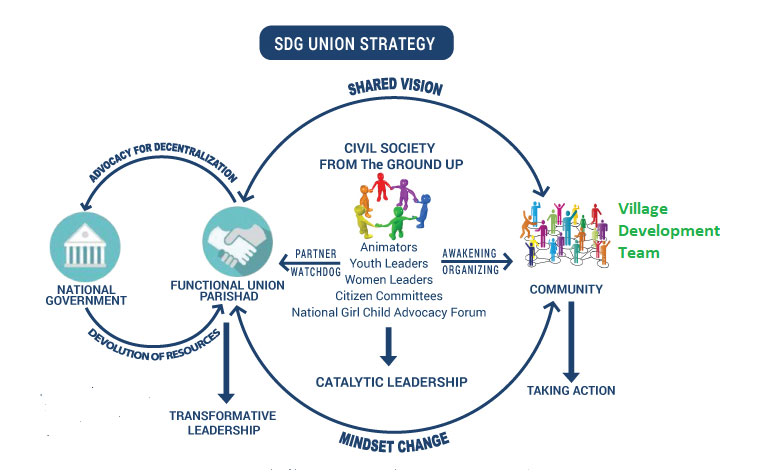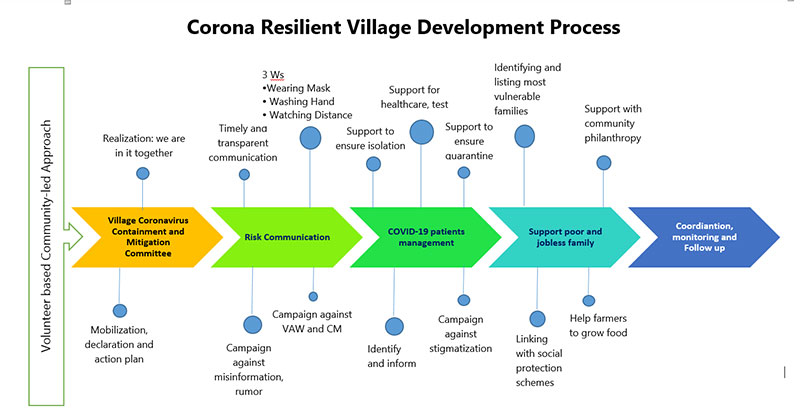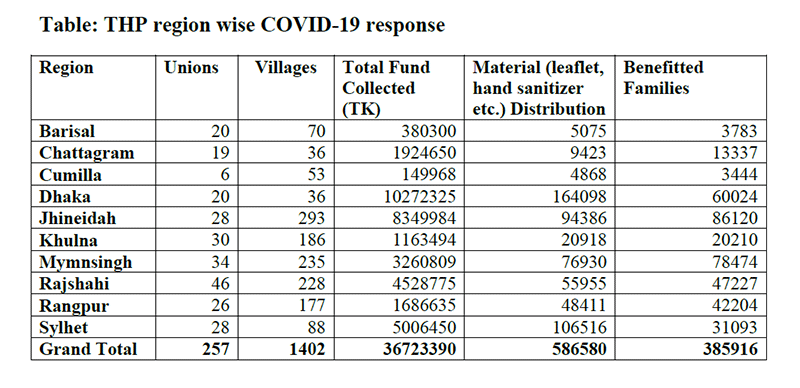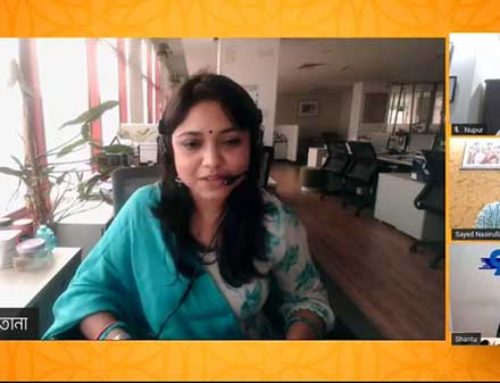Introduction of the organisation
The Hunger Project (THP) -Bangladesh is the nation’s largest volunteer-driven development organization. It was registered with the NGO Bureau, Registration No. 557, dated 11 November 1991 – the link to the certificate is here. It has trained more than 250,000 volunteers, implementing strategies for gender-focused community-led development across every district of the country, with a concentrated presence in 181 “SDG Unions.”
At the local level, THP works with the Union, Bangladesh’s smallest unit of rural government, through the SDG Union Strategy. The SDG Union Strategy empowers both the local electorate and the elected Union Parishad, which represents a cluster of villages, putting THP’s three pillars within the reach of the Bangladeshi people. It involves a partnership between the people, their local elected representatives and a civil society from the ground up to help achieve the SDGs.

Figure 1: THP’s SDG Union Strategy
At the national level, THP addresses two pernicious cultural conditions that form major barriers to ending hunger in Bangladesh: corruption and gender discrimination. This is done through the National Girl Child Advocacy Forum (NGCAF) and SHUJAN (Citizens for Good Governance), a country-wide advocacy movement for preventing corruption and promoting democratic governance. Another focus of THP is to build peace among conflicting political actors and promote tolerance and pluralism.
The centerpiece of The Hunger Project’s strategy is the grassroots training and ongoing support of more than 145,000 volunteer animators, 40% of whom are women, who organize mass action campaigns in their areas.
Programmatic interventions in response to COVID-19
Because Bangladesh was unable to contain the coronavirus in a few hotspots like Dhaka, Narayanganj and Gazipur early on, it has now spread all over the country. This “community transmission” was accentuated by the back and forth movement of people from the cities to the villages due to the misguided declaration of the general holiday in late April and Eid holidays at the end of May.
Since the coronavirus does not have an approved treatment protocol and there is no certainty when an effective vaccine will be available, we will have to live with it for quite some time. With that realization, The Hunger Project has launched an initiative in late March 2020 to create “Coronavirus Resilient Villages” around the country.
Although local governments have been largely bypassed by the central government, we have been working closely with Union Parishads in creating Coronavirus Resilient Villages. Our initiative is leveraged on the “SDG Union Strategy,” which we designed in 2015 to localize the SDGs. Village Development Teams (VDTs), self-help groups and the large number of volunteers mobilized as part of the SDG Union Strategy are the bedrock of the Coronavirus Resilient Villages initiative.

Figure 2: THP’s corona resilient village development process
Broadly speaking, the initiative involves:
First, MAKE A DECLARATION that “we are in it together” based on the realization that protection of every single person is required to protect everyone from the coronavirus in a community. Such realization creates community ownership and engagement in the efforts to contain and mitigate the spread of the virus locally.
Second, RAISE AWARENESS particularly by promoting 3Ws – washing hands, wearing masks and watching distance in order to bring about behavioral changes in the people to break the chain of infection. Our volunteers use leaflets and direct personal contact – while maintaining safe distance – to disseminate information among villagers and motivate them to practice good hygiene and manage the waste. In this effort, the volunteers access the help of the health professionals posted in Union-level community clinics and health centers. They encourage religious and community leaders to dispel misinformation and disinformation about the virus. They also sensitize their communities against violence against women and children and child marriage, which tend to increase during a pandemic.
Third, IDENTIFY, ISOLATE AND ASSIST those showing symptoms of coronavirus and help them isolate in their homes and get them professional medical help, including testing for the infection. The volunteers mobilize villagers against stigmatization of the “victims” of the coronavirus. They also arrange quarantine for newcomers in the village.
Fourth, IDENTIFY AND SUPPORT households and individuals who are on the verge of starvation due to loss of livelihood. Volunteers prepare lists of female headed households, households with children, and households with persons of mental and physical challenges. Volunteers enroll those who are eligible into the government’s social protection schemes, while helping others with money and materials collected through community philanthropy.


This self-interest-driven, communitywide and volunteer-led initiative is already making a huge difference. The initiative is underway in about 1,400 villages. The volunteers in those villages so far collected over $300,000, in cash and kind, to support those in distress.
Recommendations
- Refocus/go back to SDGs to recover from the devastation cause by the COVID-19 pandemic. Otherwise we will not be able to achieve the SDGs, especially with respect to goal of leaving no one behind.
- Promote localization of SDGs using local government as the conduit.
- Involve the LGIs, especially those closest to the door-stop of the people in containing and mitigating the impact of covid-19.
- Promote an agenda of decentralization and devolution of resources to LGIs and transfer of the government departments to Union Parishads, as per Schedule 3 of the Local Government (Union Parishad) Act, 2009.
- Advocacy with the government to create independently managed Trust Fund to support the activities of the NGOs/CSOs.





